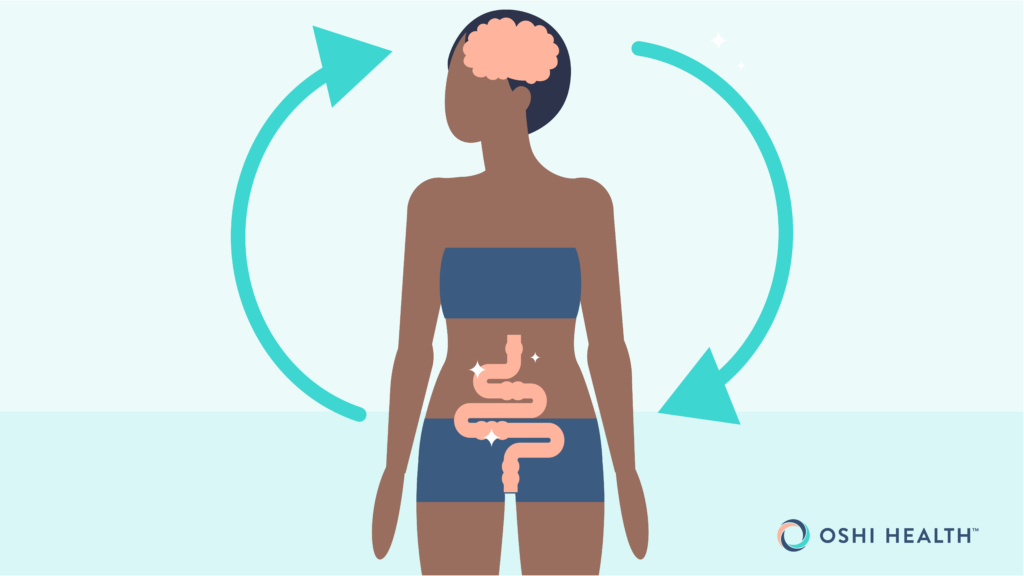Get ahead of GI issues with expert GI providers
When it comes to gastrointestinal (GI) issues, early diagnosis and treatment are crucial, but not all symptoms are obvious red flags.
Don’t wait for your symptoms to get worse. Meet our GI specialists to find lasting gut relief.
“How do I know when to see a gastroenterologist?” Many people have asked themselves this question when experiencing an ongoing gastrointestinal (GI) symptom. I can relate. Sometimes, you need to turn to a specialist for help.
For example, I see a nurse practitioner for primary care. She is amazing and provides me with what I like to refer to as my “health home.” I see her to cover the basics, like annual checkups, general labs, needed referrals, prescription refills, and to oversee my general well-being. But, I think of my body as if it were a house. For a home, a general handyperson can be helpful for minor fixes, like replacing a gutter. But sometimes you need a person with a specialty. In my house, if something is wrong with the electricity, I call an electrician. For plumbing issues, I call a plumber. You get the idea. The same is true for my body.
I have several chronic conditions. For those, I turn to my “ologists.” Over the years, I’ve seen a gynecologist, neurologist, pulmonologist, immunologist, hematologist, hepatologist, cardiologist, and gastroenterologist. This article focuses on when to see a gastroenterologist for GI symptoms, what they do, the education and training they receive, what to expect at your first appointment, and some commonly asked questions.
Understanding gastroenterology
“A gastroenterologist is a physician who specializes in diagnosing and treating conditions related to the digestive system, including the esophagus, stomach, intestines, liver, pancreas, and gallbladder,” says Michael Bass, MD, a gastroenterologist and hepatologist, and the Founding Medical Director of Oshi Health.
“They handle conditions like acid reflux, irritable bowel syndrome (IBS), inflammatory bowel disease (IBD), liver disorders, and more,” he adds. “Gastroenterologists also perform diagnostic and therapeutic procedures such as colonoscopies and endoscopies.”
Gastroenterologists undergo a rigorous medical school education. They also receive extensive training and practice in the clinical setting, with a residency and fellowship.
Get clinically-proven GI care—from almost anywhere
Oshi Health is in-network with most major insurance



Gastroenterologist education and training requirements
- Must complete a four-year bachelor’s degree and pass the Medical College Admissions Test (MCAT).
- Must complete a four-year medical school program to earn a Doctor of Osteopathic Medicine (DO) or Doctor of Medicine (MD) degree and pass the United States Medical Licensing Exam (USMLE).
- Must complete a three-year residency program in internal medicine and pass the USMLE Step 3, which tests one’s ability to practice medicine independently.
- Must complete a fellowship (two to three years) in gastroenterology and pass the American Board of Internal Medicine (ABIM) exam to become board-certified.
“Some gastroenterologists further specialize in areas like hepatology (liver), pancreatology, or advanced endoscopic procedures,” Dr. Bass says. “These fellowships last one to two years.”
GI nurse practitioners and physician associates
Some nurse practitioners (NPs) and physician associates (also known as physician assistants or PAs) also have specialized training in gastroenterology, like at Oshi Health, and may be a part of your care. These are called GI NPs or GI PAs.
- GI NPs:
- Must complete a four-year bachelor’s degree in nursing (BSN) and earn their credentials as a registered nurse (RN) by passing the National Council for Licensure Examination (NCLEX).
- Must also complete a two-year master’s program in nursing (MSN) and complete their clinicals in a GI-focused setting.
- Must pass the nationally recognized NP exam and apply for an Advanced Practice Registered Nurse (APRN) license.
- GI PAs:
- Must complete a science-focused bachelor’s degree and a two-year physician associate program that is accredited by the Accreditation Review Commission on Education for the Assistant Physician (ARC-PA). The program culminates in a master’s degree and includes clinical work.
- Must pass the Physician Assistant National Certifying Examination (PANCE) before practicing. After certification, GI PAs participate in a GI-focused fellowship.
GI-TRAINED, EXPERIENCED, AND LICENSED
An integrated team of GI specialists
Our expert gastroenterologists, GI providers, registered dietitians, and gut-brain specialists are leaders in their fields, with advanced education and training in gastroenterology. Our comprehensive team approach is personalized to meet your unique needs and address the root cause of your symptoms.
When to seek medical attention from a gastroenterologist
You should make an appointment with a gastroenterologist or another GI provider if you’re experiencing ongoing unexplained GI symptoms or if you have a condition that affects the digestive system. You should also see a GI provider if you are at a higher risk for stomach, colon, or pancreatic cancer.
See a GI provider for these symptoms
- Abdominal pain
- Bloating
- Blood in your stool
- Constipation
- Diarrhea
- GERD or heartburn
- Loss of appetite
- Nausea or vomiting
See a GI provider for these conditions and risk factors
- Anemia
- Family history of stomach or colon cancer
- Fatty liver disease
- Hepatitis
Below, we explore these categories and topics in-depth.
Gastrointestinal symptoms
In this section, we’ll look at the GI symptoms that warrant talking to a gastroenterologist or other GI clinician. I’ve included some common causes of each symptom. However, just because you have one of these symptoms does not mean you have a condition that is associated with it.
That’s why seeing a gastroenterologist can help. They can investigate underlying issues and rule out potential causes. Plus, they can formulate a care and treatment plan to help you feel better in the long run, and they can connect you with other providers for comprehensive care.
Abdominal pain
Nearly everyone will experience a stomach ache at some point in their lives, perhaps from gas, something they ate, or even stress. But if you regularly experience abdominal pain, you should see a gastroenterologist.
Regular abdominal pain could be a sign of an underlying condition, such as IBS, stomach ulcers, or gallstones.
“Abdominal pain can be a symptom of many conditions, ranging from minor issues like indigestion to more serious conditions like ulcers, inflammatory bowel disease, or even cancers,” Dr. Bass says. “Abdominal pain could also be associated with underlying mental health conditions, like anxiety or depression.”
Some conditions that commonly affect the reproductive organs could also be a reason for abdominal or pelvic pain. These include endometriosis (a systemic inflammatory condition), polycystic ovary syndrome (PCOS), and uterine fibroids. Endometriosis can also affect the GI tract and cause pain.
A gastroenterologist has extensive training to evaluate the cause of abdominal pain and manage it appropriately, ensuring that serious conditions are diagnosed early and treated effectively.
Bloating
Occasional bloating might occur for several reasons, including overindulgence at a meal. However, regular bloating is another reason to see a gastroenterologist.
You could be experiencing a sensitivity or food intolerance. Lactose intolerance is a common culprit of bloating. You may also have had a recent infection that has upset the delicate balance of your gut microbiome (the bacteria and fungi that live in your GI tract).
Other concerns regarding bloating can involve issues with gut motility, how food and waste move through your digestive tract. Sometimes bloating occurs because of a functional issue such as visceral hypersensitivity. Visceral hypersensitivity means that someone is experiencing a lower threshold for pain and discomfort in their GI tract. Endometriosis, PCOS, and uterine fibroids can also cause bloating.
Constipation or diarrhea
You’d be hard-pressed to find someone in the world who hasn’t experienced an incident—or ten!—of constipation or diarrhea in their lives. You can experience one or the other (or, as a double whammy, both at the same time). Constipation or diarrhea can happen for many reasons, including a viral infection, travel, stress, diet, lifestyle, and more.
However, if you experience one or the other or both frequently, you should see a gastroenterologist. You may have IBS. IBS has three forms.
IBS types
- IBS- C: constipation
- IBS-D: diarrhea
- ISBS-M: a mix of constipation and diarrhea
Other issues can also cause constipation and diarrhea. Diarrhea is a common symptom of inflammatory bowel diseases (IBD), such as ulcerative colitis and Crohn’s disease. Having chronic diarrhea doesn’t mean you have IBD, but you should get checked out. Diarrhea can lead to dehydration and other complications.
By the way, constipation doesn’t always mean that you can’t go number two. If you have hard-to-pass or pebble-like poops, you are experiencing constipation.
Your gastroenterologist might ask you about the consistency of your stool. Poop can be rated from type 1 to type 7 on the Bristol Stool Scale. Knowing which type you have can be helpful.
Nausea or vomiting
Even my husband, whom I joke has an “iron stomach,” has thrown up before. Often when we experience nausea or vomiting, we know why. Common causes include a viral infection, overindulging in alcohol, unknowingly eating contaminated food, and more. For me, a migraine attack can cause me to spend some “quality” time with the toilet bowl.
We can also experience nausea for a variety of reasons, including illness, anxiety, medication side effects, and motion sickness from a ride at an amusement park—or a flight or car trip that feels more like a roller-coaster.
However, ongoing or unexplained nausea or vomiting is a sign to see a gastroenterologist. You may have a dysfunction in the communication between your gut and brain, known as the gut-brain axis, or an underlying condition.
Reflux and heartburn
Heartburn can occur after eating fatty, spicy, or acidic foods. (Lookin’ at you, tomato sauce and chocolate). Sometimes over-the-counter medications, such as ibuprofen, can also lead to that burning sensation.
Gastroesophageal reflux disease (GERD), however, is a more intense and chronic form of the issue. GERD occurs when stomach acid regularly goes in the wrong direction, finding its way from your stomach to your esophagus and sometimes up to your throat. Aside from classic heartburn symptoms, GERD can also be responsible for a chronic cough and poor sleep quality.
GERD can damage your GI tract, so if you’re experiencing any of the above symptoms, talk to a gastroenterologist. They can check for any underlying reasons GERD is occurring and offer solutions to alleviate discomfort and protect tissue.
Rectal bleeding
The medical term for fresh or red blood in the stool is hematochezia, which can have many different causes, ranging from hemorrhoids to colon cancer. Seeing blood in the stool is always a reason to talk to your provider, and often a gastroenterologist. Black or tarry stools (melena) may be a sign of an upper GI-tract bleed. Seek medical attention right away.
Potential causes of rectal bleeding
- Anal fissures
- Bleeding in the upper GI tract
- Colorectal cancer
- Diverticular disease
- Hemorrhoids
- IBD
- Infections, including sexually transmitted
One more note on rectal bleeding. Beets, because of their color, can temporarily turn your stool red. Certain medications, like Pepto Bismol or iron supplements, can sometimes turn your stool black.
Weight loss
If you’re experiencing a change in your appetite or unexplained or unintentional weight loss, you should see a gastroenterologist. Digestive disorders are a common cause. However, a decrease in weight can also be a sign of several different types of cancer. That is why getting evaluated is so important.
Other causes of unexpected weight loss include mental health conditions, medication side effects, and more.
Other reasons to see a gastroenterologist
If you have a history of certain cancers in your family or underlying conditions that can affect the digestive system, you should also see a gastroenterologist.
Anemia
Rather than a diagnosis, anemia is a presentation of an underlying condition. Being anemic means you do not have enough healthy red blood cells or hemoglobin. Hemoglobin is a protein in red blood cells that delivers oxygen to your organs. Different types of anemia have different causes.
Some types are caused by low iron or vitamin deficiencies. Some GI conditions can affect how well your body absorbs nutrients from the foods you eat. These include IBD and celiac disease. This is why seeing a gastroenterologist for anemia is important.
Family history of stomach or colon cancer
If you have a family member with a history of stomach or colon cancer or some types of polyps, you are at an increased risk for developing cancer, according to the American Cancer Society.
If you are at an increased risk, a gastroenterologist can help you determine when to start regular colorectal cancer screenings, what lifestyle changes may help reduce your risk, and more. Your provider may also recommend genetic testing.
Fatty liver disease
Fatty liver disease falls into two main categories. The first is alcoholic fatty liver disease, which occurs when overconsumption of alcohol damages the liver. The second is metabolic dysfunction-associated steatotic liver disease or (MASLD). MASLD is the buildup of fat in the liver that’s not related to alcohol consumption.
MASLD affects nearly one-third of the global population, and the prevalence is increasing. One culprit of MASLD is the overconsumption of the sugars sucrose and fructose (especially high-fructose corn syrup). Recent research shows that a disrupted gut microbiome can be associated with MASLD.
Left untreated, fatty liver disease can progress to metabolic dysfunction-associated steatohepatitis (or “MASH,” a condition previously referred to as nonalcoholic steatohepatitis or “NASH”), liver cirrhosis, and hepatocellular carcinoma, which is liver cancer. This is why seeing a gastroenterologist is crucial.
Hepatitis
Hepatitis is any inflammatory condition of the liver. Commonly, it can be associated with a viral infection of the liver and includes four types: A, B, C, D, and E. Regular heavy alcohol consumption can also cause inflammation of the liver. This is called alcoholic hepatitis. Conditions that affect the liver generally warrant seeing a gastroenterologist. Your doctor can help tailor a care plan to maintain your liver health.
What to expect at a gastroenterology appointment
If you’ve booked an appointment with a gastroenterologist, here’s what you can expect.
“We’ll get a detailed history of their symptoms, medical history, assessment of family or lifestyle risk factors for cancer, and perform a complete physical exam,” says Treta Purohit, MD, a gastroenterologist and Medical Director of Oshi Health.
Your gastroenterologist may also order labs or other diagnostic tests, including imaging. And they may recommend procedures such as an endoscopy or colonoscopy if needed, she adds. Depending on their assessment, your gastroenterologist may also suggest lifestyle changes or even refer you to a GI registered dietitian or gut-brain specialist. Also, they will prescribe any needed medications.
A list of questions to ask at your first appointment
- Are any of my medications or supplements making my symptoms worse?
- Are any of my underlying conditions related to what’s going on?
- Should I make any diet or lifestyle changes?
- Do I have any nutrient deficiencies or absorption issues?
- How can I support my gut microbiome?
- What alternative treatments might help?
- What other providers should I see as part of my care plan?
- Am I experiencing a miscommunication between my gut and brain?
- Does my family or medical history increase my risk for any conditions?
- If I am at a higher risk of a condition, what lifestyle factors might lower my risk?
- How often should I schedule appointments with you?
- What signs should I watch for that I may be experiencing a flare-up?
- What should I do differently during a flare?
- What signs should I watch for that indicate disease progression?
- Does my condition have a cure? Or is it reversible?
- What causes my condition?
- What are the best ways to manage my condition long-term?
- When should I seek emergency medical attention?
Importance of an early and accurate diagnosis
If you have an underlying condition, an early diagnosis is crucial. “Many gastrointestinal conditions, such as IBD or gastrointestinal cancers, can progress and become more difficult to treat over time,” Dr. Bass says. “Catching these conditions early allows for better management, improved outcomes, and the prevention of complications such as malnutrition, bleeding, or even death.”
This was the first time that someone listened to me, asked important questions, and then connected the dots. I walked away with doable next steps without being overwhelmed!
— M.F, living with general GI symptoms
Frequently Asked Questions
-
You should see a gastroenterologist if you are experiencing any ongoing unexplained symptoms that affect your GI tract, which starts at your mouth and ends at your anus.
You should also see a gastroenterologist if you have a family history of stomach or colon cancer or if you have underlying issues that affect the digestive system, including hepatitis, anemia, and fatty liver.
-
If you have any of the symptoms or conditions covered in this article, you should make an appointment with a gastroenterologist.
-
Gastroenterologists specialize in understanding and treating symptoms or conditions that affect the digestive system. Your physician may have referred you to a gastroenterologist for their expertise in care.
-
Your gastroenterologist may perform different tests to assess your stomach. These may include X-rays, CT scans, or blood or stool tests.
They may also recommend a procedure such as an upper endoscopy or an enteroscopy. An endoscopy involves the insertion of a small tube with a tiny camera. An enteroscopy involves swallowing a small video capsule that transmits images. These procedures help your doctor assess what might be going on.
-
At your first visit, your doctor will take a complete medical history. They may order tests or procedures, and they may recommend diet and lifestyle changes and prescribe medications.
-
The American College of Gastroenterology website has a handy tool for finding a gastroenterologist in your area. You can also find a gastroenterologist and a comprehensive care team at Oshi Health.
-
You can schedule an appointment with a gastroenterologist in your area. Or you can see an Oshi Health gastroenterologist right away.
-
Based on your unique situation, your gastroenterologist will recommend how often you should see them.
Takeaway
Gastroenterologists are specialists when it comes to issues affecting the digestive system, including the esophagus, stomach, intestines, liver, pancreas, and gallbladder.
If you are experiencing an ongoing or unexplained GI symptom, such as abdominal pain, bloating, constipation, diarrhea, heartburn, and more, you should see a gastroenterologist. You should also see one if you have underlying conditions that affect the digestive system. These include anemia, hepatitis, and more.
Oshi Health offers convenient online appointments with GI providers who take a comprehensive approach to GI care. You can be seen quickly, without having to wait weeks or months.
Oshi is your partner in digestive health
Feel like your digestive concerns are running your life? You’re not alone—and we’re here to help you find lasting relief.
Oshi Health GI providers, gut-brain specialists, and registered dietitians work together to address your symptoms and find solutions that actually work for you.
Whether you’re dealing with chronic digestive issues or unpredictable symptom flare-ups, our GI specialists deliver:
✔ Personalized care plans tailored to your lifestyle
✔ Science-backed strategies to calm your gut
✔ Compassionate, whole-person care
✔ And so much more!
Ready to take control of your gut health?











